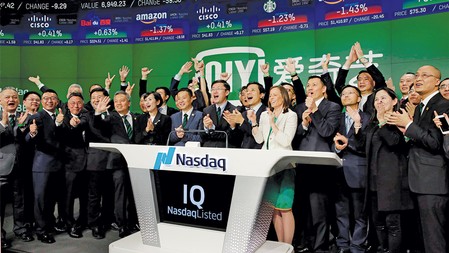China Experiments With New Ventures to Boost Movie Ticket Sales
By Patrick Frater
LOS ANGELES (Variety.com) – It’s easy to become numb to the dizzying growth figures emanating from China’s film industry. Records seem to be broken every month.
It’s also easy to assume that ’s heavy-handed government is stifling innovation in the sector. But recently launched experiments in distribution and exhibition could alter the landscape in what is expected to become the world’s largest film market.
China has more theater screens than the U.S. and Canada, but it trails the region in revenue. The Chinese box office grew 14% to $8.6 billion last year, compared with $11.1 billion in North America. By the end of 2019, China’s projected 60,000 screens are expected to boost the Middle Kingdom to the No. 1 revenue position.
The nation’s new initiatives seek to make the Chinese market not just bigger but also more diverse by scrapping conventional programming strategies and delivering films outside of traditional cinemas. “It’s both notable and interesting that all of these innovations in exhibition are occurring in China and not elsewhere, such as the U.S.,” says Rance Pow, head of industry consultancy Artisan Gateway. “The innovative boundaries are much more open in China than elsewhere.”
Already operating is the Nationwide Alliance of Arthouse Cinemas, a public-private joint venture with a circuit of 600 screens dedicated to releasing art films that would otherwise struggle for distribution against blockbusters. The circuit features both domestic titles and overseas festival winners. In another shift from the prevailing business paradigm, the alliance is not bound by the quota China imposes on foreign movies and is experimenting with on-demand programming.
A second initiative, by Chinese streaming giant iQiyi, also incorporates theatrical-on-demand. The company has just opened its first offline mini-theater, Yuke, that’s conventional in every way except for how it’s programmed. iQiyi’s 60 million subscribers can select a screening time and a film from the company’s expanding library, which is fed by iQiyi’s supply deals with Fox, Disney, Netflix and FilmNation, among others.
Even more ambitious is Smart Cinema, headed by former Wanda and Legendary executive Jack Gao. It aims to offer new-release theatrical movies to China’s billion-plus cellphone users, enlisting government-developed technology to deliver DCI-compliant 2K images. The idea is to take films to parts of the country that don’t have theaters. Buying a “ticket” to watch on a mobile device would be made simple through Alibaba or Tencent’s ubiquitous cashless payment systems, and the revenues would count toward theatrical distributors’ first-run grosses.
The venture “does not aim to compete with traditional exhibition channels,” says industry analyst Raymond Zhou. “Rather, it wants to serve the underserved segment, such as those with no access to movie theaters or with no time to go during the limited window of theatrical release. … If it succeeds, it may be a great contribution to the rising edifice of Chinese cinema.”
But that’s still a big if. “How many will want to pay a price comparable to a regular ticket for these [mobile-based] offerings?” Zhou says. The art-house circuit and iQiyi’s Yuke theater also face hurdles such as censorship and rights limitations that could slow or stifle their takeoff. All three initiatives look set to start with smaller titles that would have limited immediate commercial impact on the wider industry.
Even that could prove useful. Helping to unblock China’s distribution bottleneck — only half of the 970 movies produced last year got a theatrical release — would change the economics for producers working at the margins.
Similarly, Gao’s Smart Cinema might seem another likely futile attempt at premium VOD. But significantly higher smartphone penetration in China than in the U.S. means its chances are better and its returns potentially greater. The release of a major Chinese film on Gao’s platform could be a game-changer.
Regardless, the innovations counter assumptions that, as the Chinese film industry scales up, it will behave more like the North American market and become easier for the Hollywood majors to navigate. “China simply doesn’t bind itself to the same industry rules,” says Pow, who views the experiments as signs of growing sophistication and self-confidence. “They have perhaps modest beginnings, but the implications for the global industry are potentially huge.”

